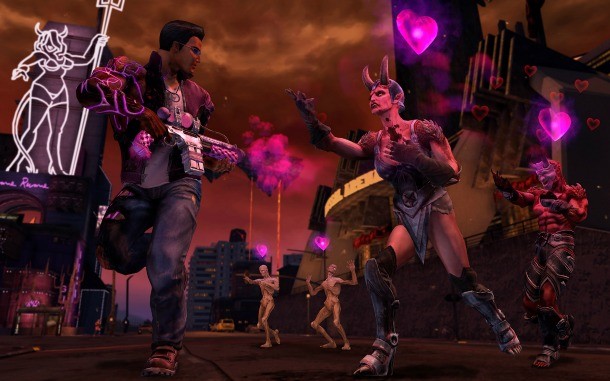Franchises That Are Nearly Unrecognizable From How They Started

This week sees the release of two games that have more in common than you might think. Resident Evil HD Remaster and Saints Row: Gat Out of Hell both feature monstrous enemies, but they’re also examples of two franchises that have significantly changed since they debuted. Today, we’re looking at these and several other series that have undergone seismic shifts since their first installments.

Saints Row
Volition’s delightfully stupid sandbox game had a far more serious beginning. When it debuted in 2006, it was a GTA clone that didn’t do much to set itself apart from Rockstar’s titanic franchise. Stilwater was still the Saints’ stomping grounds, but their capers were more grounded and gritty than later entries. Over the course of several sequels, Volition embraced the humor and over-the-top ridiculousness that it’s become known for. In eight short years, members of the Saints have gone from pulling off low-level heists (without cracking smiles) to finding themselves in Hell, set to marry Satan’s daughter – with full-on musical numbers, to boot.

Resident Evil
Contemporary audiences might think the scariest things about the 1996 release of Resident Evil were its crude graphics and abysmal voice acting. Primitive as it may have been, the game provided a frightening experience based on jump scares and the increasing tension of running out of supplies. The series continued to chart a similar course until Resident Evil 4 changed what was possible not only for the franchise but for third-person action games. Since then, players have enjoyed more action-focused gameplay made possible by its use of the over-the-shoulder action zoom. The biggest shift may very well have been moving away from those clunky tank controls.

Duke Nukem
Duke Nukem seems less than relevant these days, especially considering how poorly the long-awaited Duke Nukem Forever was received. Players who scoff at his legacy are doing themselves a disservice, however. Duke Nukem 3D was an incredibly sophisticated game for its time. The colorful and richly detailed FPS had functional mirrors, characters that left bloody footprints, flight, and the ability to tilt your virtual head – not bad for 1996. It’s even more impressive considering that Duke started out as the hero of a mediocre PC platformer in his self-titled 1991 debut.

The Legend of Zelda
From a purely visual perspective, it’s difficult to imagine a series that’s evolved more significantly than Nintendo’s Legend of Zelda. Shigeru Miyamoto clearly had a vision for the adventure game back in 1986, and mainstays like boomerangs, bombable walls (and Dodongo), and the Master Sword have made the journey throughout the decades. The visuals, however, have transformed from pixelated, 2D screens to fully realized 3D worlds. Link’s role has changed from being a singular character to a legendary hero of Hyrule, too. Even as the series has grown and transformed, you can be sure that too many people still think the little guy in the green tunic is named Zelda.

Wolfenstein
Id’s Wolfenstein 3D was a pioneering FPS in 1992. Before then people who heard the name “Wolfenstein” likely associated it with the games that inspired it, the Apple II Castle Wolfenstein games from Muse Software. Id’s games put the player in the boots of B.J. Blazkowicz, a trigger-happy maniac with a lust for killing Nazis and a penchant for finding hordes of stolen treasure. The most recent entry, The New Order, was released in 2014 and starred the same character. While players still blasted plenty of Nazis from a first-person perspective (and went on the moon), MachineGames also told a more sophisticated story, touching on sensitive subjects like the Holocaust, which likely would have been considered too much only two decades earlier.

Call of Duty
It’s easy to knock Activision’s insanely popular Call of Duty franchise for its annual installments and "releasing the same game every year." Easy, but more than a little disingenuous. Since debuting in 2003 as a fairly standard World War 2 shooter, the series has grown and evolved to include action that rivals any summer blockbuster, and fantastic multiplayer content. Play the latest installment, Advanced Warfare, and then go back to the original. With its energy weapons, robot-assisted double-jumping, and other sci-fi trappings, it’s difficult to lump it in with its Nazi-hunting roots.

Get the Game Informer Print Edition!
Explore your favorite games in premium print format, delivered to your door.
- 10 issues per year
- Only $4.80 per issue
- Full digital magazine archive access
- Since 1991









